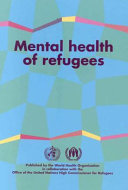
Mental Health of Refugees
By - World Health Organization
Floor
-
Floor 1
ISBN 10 - 9241544864
ISBN 13 - 9789241544863
Book Status
-
1 Qnty Available with us.
Shelf No
-
19
Call Number
-
362.208 MEN
Physical Description
-
viii, 134 pages : illustrations ; 24 cm